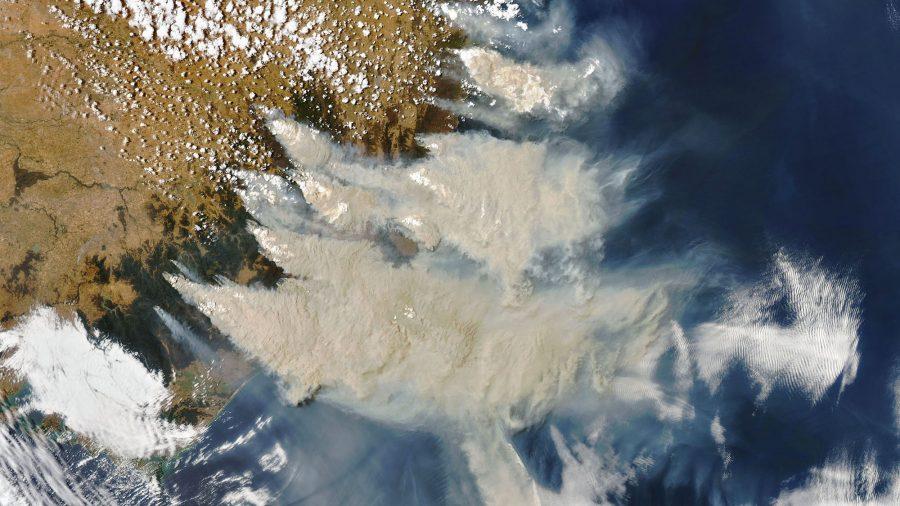The Indo-Pacific, France and Australia’s bushfire crisis
Posted By Denise Fisher on February 3, 2020 @ 11:49

During this time of national catastrophe in Australia, messages of solidarity have been pouring in from friends all over the world. For me, many have come from French friends in Europe and the Pacific.
My response includes the hope that this disaster may reinvigorate Australia both to continue to fulfil its international environmental commitments and to work with its friends to urge all jurisdictions to meet the global challenges of climate change, particularly those with a major impact, such as China, the US, the EU and India.
China, India and France (through its territories) are all, like Australia, located in what’s now called the ‘Indo-Pacific’. I have argued that Australia’s idea of the Indo-Pacific is a murky one [1]. The concept better serves the interests of subscribers with global leadership pretensions, such as India and France, than our own. This is because, while Australia plays the handling of China within the Indo-Pacific concept with ambiguity, others overtly push the idea of clubbing together to ‘balance’ China. None of them has China as its number one trading partner as we do. And, while our regional cooperation with South Pacific neighbours hasn’t been perfect, arguably France, India and the US all have less successful records in their own immediate regional neighbourhoods. India, for example, engaged in war with its neighbour, China, in the 1960s.
France came on board the Indo-Pacific concept with an announcement [2] by visiting President Emmanuel Macron at Garden Island in May 2018, which at the time puzzled many observers who had never considered his idea of a strategic arc from Paris through New Delhi to Canberra. His main game became clearer to those new to French Pacific policy when he went on to use the concept [3] in New Caledonia as a way to nudge voters who were soon to vote for or against remaining French.
While Australia dances around the idea of who is part of the Indo-Pacific, and whether or not China is included, Macron was up front. Remain with France, he told New Caledonians, and you will have a strong capability to resist the encroaching influence of a hegemonic China at your doorstep [4]. New Caledonians voted 57% to stay with France (however, the remaining 43% comprised virtually the entire population of indigenous Kanaks, making the next two possible votes on independence before 2022 a matter of ongoing interest).
Macron’s decision to make his announcement in the South Pacific was no accident. From the 1990s, when French senior officials routinely denied any strategic motivators for determinedly retaining France’s string of overseas possessions, particularly in the Pacific, a series of French public analyses has highlighted the value of those possessions [5] in extending France’s influence (what it calls rayonnement) and in engaging it in parts of the world that are becoming more significant as great-power balances change and new resources are in ever-growing demand.
France has exerted considerable effort in the past 20 years to restore a positive image in the Pacific, where it was seen as a pariah in the 1970s and 1980s for its nuclear testing there and for rejecting demands for independence. It has worked with Australia and New Zealand in disaster management and fisheries intelligence-sharing in the FRANZ arrangement, conducts regular defence exercises with them and other island armies, and participates in the Pacific Islands Forum and the South Pacific Commission. It has also not shirked from using its approach on climate change, which is more similar to that of the island governments than to Australia’s, to shore up its regional position, providing helpful support (albeit small-scale relative to Australian assistance even in this contentious space).
While Australia, like regional governments, values the constructive role of France and, probably more than most, sees strategic benefit in France’s positive engagement, including in the ‘Indo-Pacific’, Canberra doesn’t set its regional activities so overtly against China as does France.
The eyes of the world have somewhat uncustomarily turned towards Australia as millions of hectares burn. Along with sympathy, overseas demonstrations [6] cast blame directly at alleged Australian government policy insufficiency.
The Australian government should direct its diplomats overseas, as they express appreciation for the sympathy of overseas governments, to defend and reaffirm the national record in fulfilling commitments, and to seize this opportunity to urge all governments to address global environmental concerns practically.
Here, the Indo-Pacific dynamic takes on a new potential role. Surely Australia can work with France—a prominent champion in combating environmental threats—to urge major emissions contributors (India, the US, and, yes, China) to make an Indo-Pacific environmental effort. Apart from having a real impact on emissions, this could lend a more inclusive, cooperative and enduring purpose to the Indo-Pacific concept than has been evident to date.
Article printed from The Strategist: https://aspistrategist.ru
URL to article: /the-indo-pacific-france-and-australias-bushfire-crisis/
URLs in this post:
[1] Australia’s idea of the Indo-Pacific is a murky one: https://www.policyforum.net/australia-needs-indo-pacific-clarity/
[2] an announcement: https://www.afr.com/politics/emmanuel-macrons-australiafranceindia-strategic-axis-a-bit-of-a-stretch-20180503-h0zkxy
[3] use the concept: https://www.lowyinstitute.org/the-interpreter/french-choreography-pacific
[4] of a hegemonic China at your doorstep: http://www.lowyinterpreter.org/publications/new-caledonia-s-independence-referendum-local-and-regional-implications#sec36791
[5] highlighted the value of those possessions: https://www.diplomatie.gouv.fr/IMG/pdf/livre_blanc-com-_fr-eng_cle876fb2-1.pdf
[6] overseas demonstrations: https://www.abc.net.au/news/2020-01-11/scott-morrison-labelled-laughing-stock-europe-climate-protests/11859988
Click here to print.